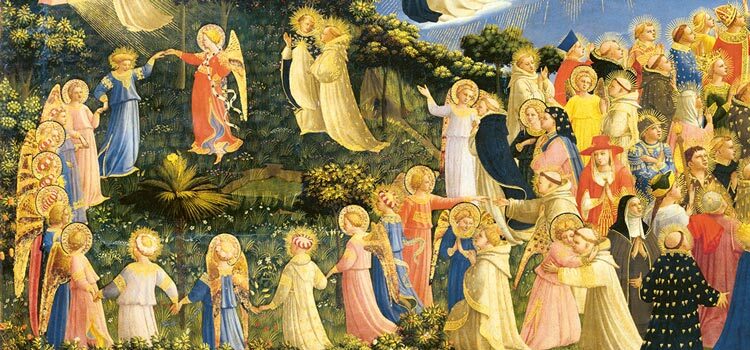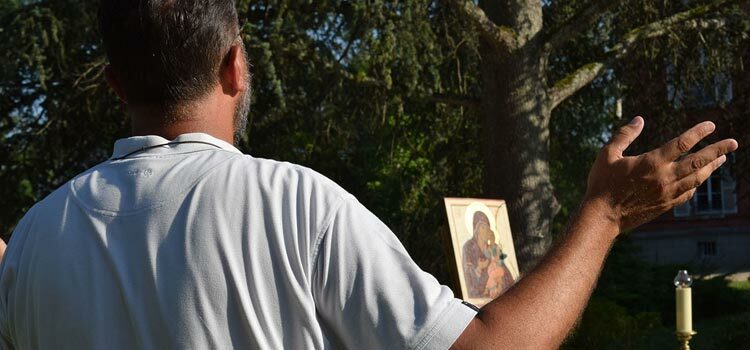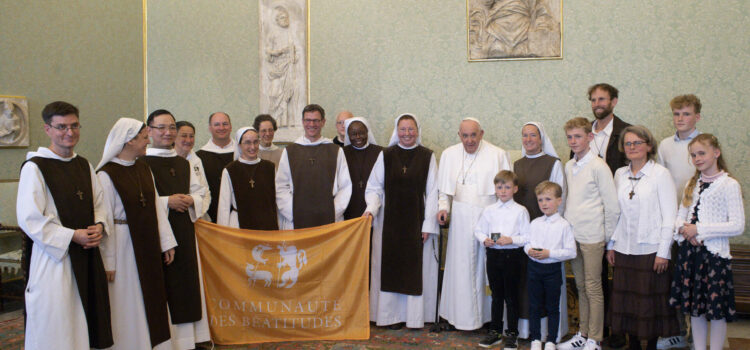Antonella’s family was a victim of the explosion in the harbour of Beyrouth on the 4th of August 2020 which claimed 240 victims and injured some 5000 people not counting the material damage. One year later, a young woman, who was committed to a life of prayer, told of her grief because she could not pray with fervour : « I cannot bring myself to pray, or to think about God. Time goes by and I am still asking Him why He has forsaken us ? Why does He not provide justice to the victims ? Why does He not answer our prayers ? »
In fact we inherit a pattern of prayer we think perfect : To collect ourselves in silence before God during a consistent time where we have an outpouring of good feelings and good resolutions.
Anything outside this picture would not be « orison ». In difficult times, we often give up praying or believe that we are not praying if we do not say our prayers with fervor.
Men and Women of biblical times
However, Scripture teaches us, through the experience of biblical characters, that we can open ourselves to union with God, the goal of prayer, by simple and accessible means, especially in difficult moments.
Did Abraham not pray when he believed in God’s promise to bless him and give him offspring, someone coming from his flesh despite his and Sarah’s old age ? Did he not pray when he pleaded for Sodom and Gomorrah, entering into a communion with God and with those he wanted to save from perdition ? To do orison is to surrender in the hands of God, to remember his Covenant, to present our requests to Him to the point of bargaining with Him and hoping against all hope for the realization of his promises.
Didn’t Moses pray when Amalek came and fought Israel in Rephidim (see Ex. 17,8-9) ? His raised hands secured victory for Israel. To pray, is to stand on the holy mountain, where our God awaits us, to listen to Him in order to be led to victory.
Didn’t David do orison during his life as a sheperd, husband, father, warrior and king ? The psalms show us a man of flesh and blood, who loved, worked and sinned, went to war, even killed and who knew, in all these circumstances, how to invoke the God of his life. To practice orison is to dwell in God, to turn to Him in joy or distress, in sin and grace, in misfortune and blessing.
Men and Women of our times
Jesus is the faithfull witness of orison which unites Him to the Father. He withdrew alone or with his disciples to pray (see Lc 5,16 ; 6,12; 9,18 et 11,1-13). His final prayer in the garden of Gethsemane shows us that God never leaves his friend alone in the face of trials, including death (Mt.26,36-46 ; Mc 14,32-42 ; Lc 22,39-46) But Jesus does not pray alone. The angels are present, the Father is present even if He seems to abandon him. The Comforter is present. So he can surrender in the hands of the Father and carry out his will to the end. He knows death will not have the last word.
Therese of Lisieux recounts two very instructive episodes on the way she lived orison: She writes « It seems to me that when Jesus comes down into my heart He is happy to be so well received and I am happy too … All this does not prevent from distractions or sleep to visit me, but at the end of thanksgiving seeing how badly I have done it, I take the resolution to give thanks all the rest of the day (…) » Manuscript A folio 80 recto. Therese understood that she must not be driven by the spirit of fear but that she must take advantage her miseries. To make orison is to accept hearing Jesus tell us, as He said to Peter : « Simon, you are sleeping ! You have not been able to stay awake for an hour » (Mc, 37-40) and to offer Him our sleep, promising to be more awake next time.
Therese recounts another episode in which she offered up an unbearable noise that distracted her during orison : “So I remained quiet, I tried to unite myself to the Good God, to forget the little noise… everything was useless, I felt sweat soaking me and I was obliged to do nothing but an orison of suffering. But while suffering, I sought the way to do it not with annoyance, but with joy and peace, at least in the intimacy of the soul, then I tried to like the small noise that was so unpleasant ; Instead of trying not to hear it (which is impossible), I put my attention to listening to it as if it were a delightful concert, and all my orison (which was not one of quietude) was spent in offering this concert to Jesus” (Manuscript C, folio 30).
It is also said that a rabbi who was led to his death in a concentration camp,went through this difficult ordeal reciting the Shema Israel aloud. Some were mocking him and saying « Why do you go on praying and invoking your God ? Where is He to save you ? » The man answered : « I have always repeated this prayer telling God I loved Him with all my heart, with all my soul and with all my strength, and now has come the moment to prove it. My God is with me. » This rabbi’s prayer was his cry of trust in spite of the trial he was experiencing.
Whether we exprience orison in comfort or in suffering, in praise or desire, the saints invite us to surrender our weapons, our views and our ideas to assume our reality as it is and to offer it to Jesus so He can offer it to the Father such as it is. They tell us that what is essential is our willingness to follow Jesus and persevere in the desire to be with Him and unite ourselves with Him, body, soul and spirit.
God is with us
On the one hand, we want to unite ourselves to God and win the Kingdom at the cost of our religious practices and daily struggles because « the kingdom of heaven has suffered violence and men of violence take it by force. (Mt.11,12). On the other hand, the Lord invites us to rest on his heart in the face of life’s harsh trials and endless crises. Thus, to pray by offering up one’s physical pain, to pray laying before God all the anger we feel facing our fight with sickness, to pray crying because we are unable to forgive a friend who has betrayed us or in silence in order not to disturb the neighbor who works next door, to pray without any other weapon than faith, hope and love, is this not the prayer that God, who probes hearts and minds, accepts. (Jr 11,20 ; 17,10 and 20,12 ; Ps 138,1324) ?
Quote
« For me, prayer is an impulse of the heart, a simple glance towards Heaven, a cry of recognition and love, in the midst of trial as well as in the midst of joy; finally, it is something great, supernatural, which expands my soul and unites me to Jesus. »
St Therese of Lisieux
« Forever lasts a long time»
Let us listen to the reproach addressed by the Lord to those who claim to be his faithful : « Your love is like a morning cloud, like the dew that dissipates early » (Hosea 6,4). It is not difficult, in fact, to say « I love you ». The difficulty begins when one says « forever » and especially when it comes to realizing it. Because « forever lasts a long time ». As long as the attraction exerted by the beloved remains strong, one remains attached to him without effort or pain. But so that the attraction does not diminish as the “realities of existence” are revealed, the one who loves should be able to renew it, to maintain it at least in its initial content (…) For what attracted you yesterday with reason deserves to attract you again today, if you still have the strength to rise from caprice to fidelity, from recriminations to melodies (Father Jerôme, Because forever lasts a long long, Le Sarment-Fayard,1986, p.162-163)
To go further……Just for today I meditate on a passage of Scripture related to the trial I am experiencing and I ask God for His grace, to live my own trials in union with Him. Readings
Video :
|
Find the previous articles in our “Life of prayer” series.
(publication edited by brothers and sisters of the Community of the Beatitudes – © rights reserved).





